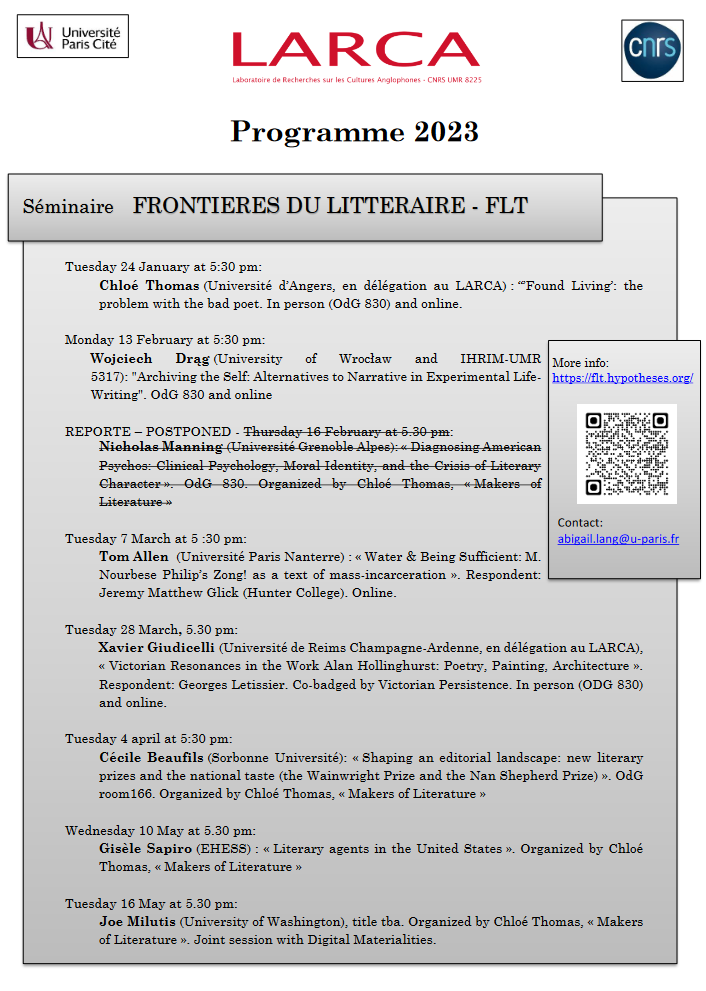07 juin 2023 - 17 h 30 min - 19 h 30 min
This is both an in-person and online event :
- Université Paris Cité, Bâtiment Olympe de Gouges, Place Paul Ricœur, 8è étage, salle 830.
-
Zoom link: https://u-paris.zoom.us/j/82914593918?pwd=cnYwSHN1YWY3UDNSSFhnaXIzOHF1UT09
ID de réunion : 829 1459 3918
Code secret : 043174
Victorian Resonances in Alan Hollinghurst’s Fiction: Queer Temporalities and Intermedial Dialogues
“For most of us, the odour of defunct Victoriana is so unpleasant […] that we are content to leave the past where we find it” (Ezra Pound, 1918).
“It is not that what is past casts its light on what is present, or what is present its light on what is past; rather, image is that wherein what has been comes together in a flash with the now to form a constellation” (Benjamin 462).
Alan Hollinghurst’s fiction—6 novels to date, published between 1988 and 2017, including the Booker-prize winning The Line of Beauty (2004)—albeit always set in the twentieth century and often in its second half, frequently references Victorian literature, art and architecture. A snippet from Alfred Lord Tennyson’s “In Memoriam A.H.H” (1850) provides the title for the 2011 novel The Stranger’s Child. William Holman Hunt’s The Shadow of Death (1873-1874) plays a role in The Line of Beauty; Edward Burne-Jones is evoked in The Folding Star (1994). The campaign to preserve London’s Saint Pancras railway station (1868) led by poet John Betjeman and others in the 1960s is alluded to in The Stranger’s Child, to give but a few examples. Hollinghurst’s fictional universe would thus be akin to a Victorian well-filled interior, a display of collections whose aesthetics some might view as a literary equivalent of so-called heritage film, in which “[…] historical narrative is transformed into spectacle, heritage becomes excess, not functional mise-en-scène, not something to be used narratively, but something to be admired” (Higson 149).
However, I argue that Hollinghurst’s “collection” of Victoriana is not a mere backward-looking, nostalgic enterprise of salvaging, but that it partakes of a queer gesture and points to queer temporalities the novels suggest. Acting as a “point of resistance” to what Walter Benjamin called “homogeneous empty time” (i.e. linear historicism), queer temporality may be defined as an affective perception of time which questions the legitimacy of adopting chronological time to non-heteronormative ways of being and “propos[es] other possibilities for living in relation to indeterminately past, present and future others” (Freeman 22). It traces what Michel Foucault (reprising a Nietzschean concept) calls genealogy, i.e. the quest for a plural and sometimes contradictory past, and it forms “constellations”, dialectic images wherein past and present “come together in a flash”.
I will further contend that the intermedial dialogues within Hollinghurst’s novels—here in particular the relationships between texts and Victorian images and architecture—destabilise the linearity of narrative and contribute to fostering networks in which texts and images, the old and the new, interpenetrate and coalesce. The Victorian texts, images and buildings embedded in Hollinghurst’s texts help to suggest a conception of time that is non-linear, dynamic, based on untimely returns and resurgences, on Pathosformeln (pathos formulas), to use Aby Warburg’s concept as redeployed by Georges Didi-Huberman, i.e. emotionally charged tropes which re-appear and bring together past and present. Hollinghurst’s fiction is, I will try to show, an echo chamber in which the “life of the [Victorian] past” persists and resonates in/with our present.
References
- Benjamin, Walter, The Arcades Project. Trans. Howard Eiland and Kevin McLaughlin. Cambridge, Mass./London: The Belknap Press of Harvard UP, 1999.
- Didi-Huberman, Georges. L’Image survivante. Histoire de l’art et temps des fantômes selon Aby Warburg. Paris : Éditions de Minuit, « Paradoxe », 2002.
- Foucault, Michel, « Nietzsche, la généalogie, l’histoire », dans Hommage à Jean Hyppolite, Paris, PUF, 1971.
- Freeman, Elizabeth, Time Binds: Queer Temporalities, Queer Histories, Durham, Duke UP, 2010.
- Higson, Andrew, English Heritage, English Cinema: Costume Drama since 1980, Oxford, Oxford University Press, 2003.
Xavier Giudicelli is Senior Lecturer at the English Department of the University of Reims Champagne-Ardenne and currently research fellow at LARCA. His research interests include Oscar Wilde, fin-de-siècle art and literature, and word and image studies. He authored a monograph entitled Portraits de Dorian Gray. Le texte, le livre, l’image (Paris, PUPS, 2016), which proposes an analysis of illustrated editions of Oscar Wilde’s The Picture of Dorian Gray. He edited an issue of Études anglaises on Wilde and the arts in 2016 and co-edited a volume
Qu’entend-on par « littérature » ? Qu’enseigne-t-on aujourd’hui sous cette étiquette, sachant que le littéraire déborde les limites que lui imposait autrefois la littérature comme discipline ? Quelles sont les conséquences herméneutiques, épistémologiques, méthodologiques et pédagogiques, de ce déplacement ? Couvrant l’ensemble de l’aire anglophone depuis la Renaissance jusqu’à l’extrême contemporain, les travaux de l’axe Frontières du littéraire proposent une réflexion formelle et modale (en lien avec les cultures visuelle, matérielle et la traduction) sur ce qu’implique, déjoue, reconfigure l’appellation « littérature », une appellation qui ne recoupe que partiellement celle, conjointe, du « littéraire ». La recherche au sein de FLT vise à interroger nos cadres théoriques, nos catégories de pensée et nos corpus grâce à une pratique critique et politique de la transversalité. Penser le littéraire comme frontière et penser à la frontière du littéraire et d’autres modes de représentation du monde ou de savoirs sur le monde (notamment ceux des sciences humaines et sociales, voire des sciences dures), penser le littéraire et la littérature comme toujours déjà pris dans le monde, c’est faire de notre pratique de la littérature (écriture, lecture, exégèse) un lieu de relance et de critique de l’espace commun. En tant qu’équipe de spécialistes de littératures anglophones en France, l’axe FLT entend tirer parti de sa situation elle-même frontalière pour contribuer à la réflexion menée tant aux Etats-Unis qu’en Grande Bretagne sur les nouvelles approches des littératures anglophones, et, plus largement, au débat actuel sur la pratique et la théorie de la littérature.
Responsable du séminaire
Carnet de l’axe et du séminaire :



